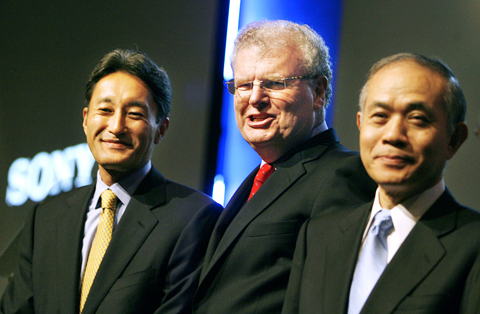Sony outlined its strategy for growth yesterday geared at regaining its lead in TVs, wiping out the red ink in video games and rolling out movie download services to woo Net-savvy consumers.
Sony chief executive Howard Stringer vowed the company will become profitable in its money-losing TV and game businesses during this fiscal year ending next March.
Stringer said Sony has achieved recovery since 2005 by exiting or downsizing 15 product categories, reducing 10,000 global workers and shutting down 11 manufacturing sites.

PHOTO: AP
When Stringer, a Welsh-born American, became the first foreigner to head Sony, the manufacturer of the Walkman portable player and PlayStation 3 game console had been battered by cheaper rivals and fallen behind in key products such as digital music players to innovative makers like Apple Inc.
“Our job, however, is not complete,” he said in outlining the strategy for the Japanese electronics and entertainment company at its Tokyo headquarters. “We must complete our transformation.”
Stringer said Sony must now come up with better software and services in its products that match its longtime reputation for hardware gadgets and entertainment content.
In the fall, Sony will start delivering in the US feature films and TV shows directly to Bravia TVs, without using satellite or cable distribution systems, but through the Internet, an industry first, he said.
That service will start with Hancock from Sony Pictures, which is becoming available before it comes out on DVD, Stringer said.
A similar movie download service will also come for its PlayStation 3 home console in the summer in the US, said Kazuo Hirai, who heads Sony Corp’s video game unit. The service will be offered in Japan and Europe at later dates, although details are not available until next month.
“Please expect more from our evolving PlayStation business,” Hirai told reporters.
Although Sony made an error in not pursuing flat-panel TVs soon enough, the company has now the No. 1 global share in liquid-crystal-display (LCD) TVs, said Sony president Ryoji Chubachi, who heads the company’s electronics operations. He credited the joint-venture in panel production with South Korean rival Samsung Electronics Co.
Sony will better focus on core businesses, which the executives said would now include its gaming business, as well as personal computers, Blu-ray disc products, computer chips, LCD TVs, digital cameras and mobile phones.
Sony is investing ¥1.8 trillion (US$16.7 billion) over the next three years for future technology, mostly to beef up those core areas, executives said.
Sony said it hopes to double annual sales from Brazil, Russia, India and China overall to ¥2 trillion by March 2011.
“Sony believes that the largest growth opportunities exist outside its traditional markets of Japan, North America and Europe,” it said in a statement.
Stringer said Sony continues to be focused on profitability, setting a target of 5 percent operating profitability margin.
“When Sony is united, Sony is unbeatable,” he said.

MORE VISITORS: The Tourism Administration said that it is seeing positive prospects in its efforts to expand the tourism market in North America and Europe Taiwan has been ranked as the cheapest place in the world to travel to this year, based on a list recommended by NerdWallet. The San Francisco-based personal finance company said that Taiwan topped the list of 16 nations it chose for budget travelers because US tourists do not need visas and travelers can easily have a good meal for less than US$10. A bus ride in Taipei costs just under US$0.50, while subway rides start at US$0.60, the firm said, adding that public transportation in Taiwan is easy to navigate. The firm also called Taiwan a “food lover’s paradise,” citing inexpensive breakfast stalls

TRADE: A mandatory declaration of origin for manufactured goods bound for the US is to take effect on May 7 to block China from exploiting Taiwan’s trade channels All products manufactured in Taiwan and exported to the US must include a signed declaration of origin starting on May 7, the Bureau of Foreign Trade announced yesterday. US President Donald Trump on April 2 imposed a 32 percent tariff on imports from Taiwan, but one week later announced a 90-day pause on its implementation. However, a universal 10 percent tariff was immediately applied to most imports from around the world. On April 12, the Trump administration further exempted computers, smartphones and semiconductors from the new tariffs. In response, President William Lai’s (賴清德) administration has introduced a series of countermeasures to support affected

CROSS-STRAIT: The vast majority of Taiwanese support maintaining the ‘status quo,’ while concern is rising about Beijing’s influence operations More than eight out of 10 Taiwanese reject Beijing’s “one country, two systems” framework for cross-strait relations, according to a survey released by the Mainland Affairs Council (MAC) on Thursday. The MAC’s latest quarterly survey found that 84.4 percent of respondents opposed Beijing’s “one country, two systems” formula for handling cross-strait relations — a figure consistent with past polling. Over the past three years, opposition to the framework has remained high, ranging from a low of 83.6 percent in April 2023 to a peak of 89.6 percent in April last year. In the most recent poll, 82.5 percent also rejected China’s

PLUGGING HOLES: The amendments would bring the legislation in line with systems found in other countries such as Japan and the US, Legislator Chen Kuan-ting said Democratic Progressive Party (DPP) Legislator Chen Kuan-ting (陳冠廷) has proposed amending national security legislation amid a spate of espionage cases. Potential gaps in security vetting procedures for personnel with access to sensitive information prompted him to propose the amendments, which would introduce changes to Article 14 of the Classified National Security Information Protection Act (國家機密保護法), Chen said yesterday. The proposal, which aims to enhance interagency vetting procedures and reduce the risk of classified information leaks, would establish a comprehensive security clearance system in Taiwan, he said. The amendment would require character and loyalty checks for civil servants and intelligence personnel prior to